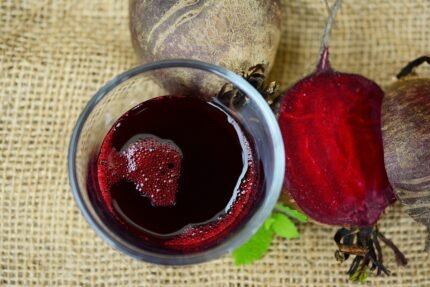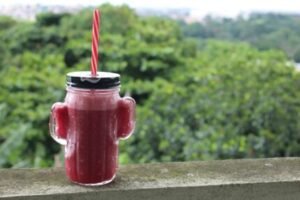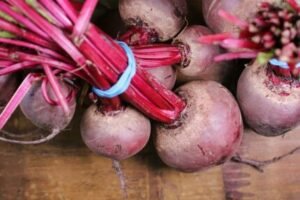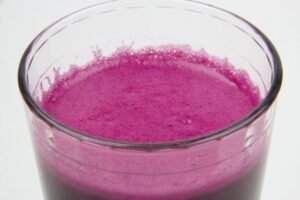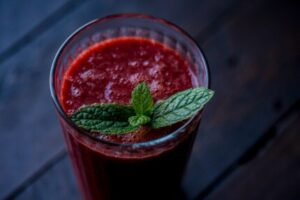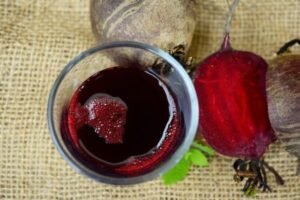Medically reviewed by Dr. Ramesh Gaddam, M.D. — Written by Sumalatha, D.N.H.E
Table of Contents
ToggleBeetroot juice is a popular drink packed with essential vitamins and minerals.
Known for its deep red color, this juice offers many health benefits.
From supporting heart health to boosting energy levels, beetroot juice can improve overall well-being.
It’s also rich in antioxidants, which help protect the body from damage.
Whether you’re looking to improve your workout performance or simply stay healthy, beetroot juice is a simple and tasty way to give your body a natural boost.
Here are the Health Benefits of Drinking Beetroot Juice:
1. Rich Source of Nutrients
Beetroot juice is full of important nutrients that can benefit your health.
It contains vitamins like vitamin C, which helps your body fight off sickness, and folate, which is essential for cell growth.
The juice also provides potassium, a mineral that helps keep your heart and muscles working properly, and iron, which is important for healthy blood.
One of the standout features of beetroot juice is its antioxidants.
These powerful substances help protect your body from harmful molecules called free radicals.
By reducing oxidative stress, antioxidants can lower the risk of many health issues.
Even though beetroot juice has less fiber than whole beets, it still supports healthy digestion when enjoyed as part of a balanced diet.
2. Supports Heart Health
Drinking beetroot juice can be great for your heart.
It is high in nitrates, which turn into a gas called nitric oxide in your body.
Nitric oxide helps widen blood vessels, making it easier for blood to flow.
This can lower blood pressure, which is good for heart health.
By improving blood flow and reducing blood pressure, beetroot juice may help lower the risk of heart disease and stroke.
Regularly enjoying this juice can be a simple way to take care of your heart and support overall cardiovascular health.
3. Boosts Athletic Performance
Beetroot juice is a favorite among athletes because it can help improve performance.
The nitrates in the juice increase how efficiently your body uses oxygen during exercise.
This means you can work out harder and for longer without feeling as tired.
Many athletes drink beetroot juice before their workouts to delay fatigue.
This can lead to better results, whether you’re running, cycling, or lifting weights.
Adding beetroot juice to your routine may help you reach your fitness goals more easily.
4. Enhances Brain Function
Beetroot juice can also be good for your brain.
The nitrates it contains help increase blood flow to the brain, which can improve how well your brain works.
This is especially important for older adults, as better blood flow may help keep the mind sharp.
Drinking beetroot juice regularly might help prevent memory problems as you age.
By supporting healthy brain function, beetroot juice can play a role in keeping your mind active and focused throughout your life.
5. Supports Liver Health
Beetroot juice is helpful for your liver, the organ that cleans your blood and helps your body remove toxins.
It contains a substance called betaine, which can improve liver function and support the detox process.
Drinking beetroot juice can help your liver work better and stay healthy.
Additionally, the antioxidants in beetroot juice may protect the liver from damage and reduce fat buildup.
This can be especially beneficial for people at risk of liver problems, helping to maintain overall liver health and function.
6. Improves Digestive Health
Beetroot juice is good for your digestion.
It can help your stomach break down food better, making it easier for your body to absorb nutrients.
The natural compounds in beetroot juice can stimulate the production of digestive juices, which aid in the digestion process.
Moreover, the antioxidants in beetroot juice can reduce inflammation in the gut, supporting a healthier digestive system.
By including beetroot juice in your diet, you may promote better digestion and overall gut health.
7. Supports Immune System
Beetroot juice is a great way to boost your immune system.
It is rich in vitamin C, which helps your body fight off infections and stay healthy.
This vitamin plays a key role in keeping your immune system strong.
Additionally, the antioxidants found in beetroot juice help reduce inflammation and protect your body from damage.
By drinking beetroot juice regularly, you can support your immune health and help your body stay ready to fight against illnesses.
8. May Aid in Weight Loss
Beetroot juice can be a helpful drink if you’re trying to lose weight.
It is low in calories and fat, making it a healthy choice.
Drinking beetroot juice can also help you feel full, which may reduce your overall food intake throughout the day.
Including beetroot juice in your diet can add flavor and nutrition without adding many calories.
This makes it easier to stick to your weight loss goals while enjoying a delicious and refreshing drink.
9. Promotes Skin Health
Beetroot juice is beneficial for your skin.
Its rich antioxidants help fight off free radicals, which can cause skin damage and early aging.
By reducing oxidative stress, beetroot juice can help keep your skin looking fresh and healthy.
Additionally, drinking beetroot juice may improve blood circulation, providing your skin with more nutrients and oxygen.
This can lead to a natural glow and a healthier complexion.
Including beetroot juice in your diet can be a simple way to support your skin’s health and appearance.
10. May Help Combat Inflammation
Beetroot juice may help reduce inflammation in the body.
Inflammation can lead to various health problems, including heart disease and arthritis.
The natural compounds in beetroot juice, such as betalains, have anti-inflammatory properties that can help calm inflammation.
By drinking beetroot juice regularly, you may experience less joint pain and swelling, especially if you have conditions like arthritis.
This makes beetroot juice a valuable addition to your diet for promoting overall health and well-being.
Beetroot Juice Nutrition
| Nutrient | Amount | % Daily Value |
|---|---|---|
| Calories | 58 | 3% |
| Total Fat | 0.2 g | 0% |
| Saturated Fat | 0 g | 0% |
| Cholesterol | 0 mg | 0% |
| Sodium | 106 mg | 5% |
| Total Carbohydrates | 13 g | 4% |
| Dietary Fiber | 2 g | 8% |
| Sugars | 9 g | – |
| Protein | 2 g | 4% |
| Vitamin C | 4 mg | 7% |
| Folate | 136 mcg | 34% |
| Potassium | 442 mg | 13% |
| Iron | 1.1 mg | 6% |
| Magnesium | 23 mg | 6% |
| Calcium | 32 mg | 3% |
| Antioxidants | Varies | – |
How to Incorporate Beetroot Juice?
Drink It Fresh
The easiest way to enjoy beetroot juice is to drink it fresh.
You can buy it from stores or make your own at home using a juicer.
Mix with Other Juices
Combine beetroot juice with other juices like apple, carrot, or orange for added flavor and sweetness.
This makes it more enjoyable if you find the taste of beetroot too strong.
Smoothies
Add beetroot juice to your morning smoothie.
Blend it with fruits like bananas or berries, and some yogurt or milk for a delicious and nutritious drink.
Salad Dressings
Use beetroot juice in homemade salad dressings.
Mix it with olive oil, vinegar, and herbs to add color and flavor to your salads.
Soups
Stir beetroot juice into soups for extra nutrition and a vibrant color.
It pairs well with vegetable or lentil soups.
Cooking Grains
Cook rice or quinoa in beetroot juice instead of water.
This adds a beautiful color and a hint of sweetness to your grains.
Ice Cubes
Freeze beetroot juice in ice cube trays.
You can add these cubes to drinks or smoothies for a cool twist.
Healthy Popsicles
Blend beetroot juice with yogurt and freeze it in popsicle molds for a refreshing treat.
Potential Side Effects
While beetroot juice is healthy, it can cause some side effects in certain people.
Here are a few to consider:
Color Changes in Urine and Stool
After drinking beetroot juice, you might notice your urine or stool turning a pink or red color.
This is usually harmless and happens because of the natural pigments in beets.
However, it can be surprising, so don’t be alarmed.
Blood Pressure Changes
Beetroot juice can lower blood pressure due to its high nitrate content.
While this is often beneficial, people with low blood pressure should be cautious.
It’s best to consult with a doctor if you have concerns.
Stomach Upset
Some people may experience stomach discomfort or gas after drinking beetroot juice.
If this happens, you might want to reduce the amount you drink or try mixing it with other juices to ease digestion.
Allergic Reactions
Though rare, some individuals may have an allergic reaction to beets.
Symptoms can include itching, rash, or swelling.
If you notice any unusual symptoms, stop drinking beetroot juice and consult a doctor.
Interaction with Medications
Beetroot juice may interact with certain medications, especially those that lower blood pressure or affect blood sugar levels.
If you are taking medication, it’s a good idea to talk to your healthcare provider before adding beetroot juice to your diet.
By being aware of these potential side effects, you can enjoy beetroot juice while keeping your health in mind.
Conclusion
In summary, beetroot juice is a nutritious drink that offers many health benefits.
From supporting heart health and boosting athletic performance to promoting better digestion and a strong immune system, it can enhance your overall well-being.
Drinking beetroot juice regularly may also help improve brain function, support liver health, and even promote glowing skin.
Adding beetroot juice to your daily routine is a simple and tasty way to enjoy these benefits.
However, as with any food or drink, it’s best to enjoy it in moderation and as part of a balanced diet
Frequently Asked Questions (FAQs)
What Happens If We Drink Beetroot Juice Daily?
Drinking beetroot juice daily can offer several health benefits, including improved heart health, better digestion, and increased energy levels.
However, it’s important to drink it in moderation to avoid potential side effects like changes in urine color or stomach discomfort.
What Is the Best Time to Drink Beetroot Juice?
The best time to drink beetroot juice is in the morning or before a workout.
Consuming it on an empty stomach may enhance its benefits and help boost energy levels throughout the day.
What Organs Is Beet Juice Good For?
Beet juice is beneficial for several organs, including the heart, liver, and kidneys.
It helps improve blood circulation, supports detoxification, and promotes overall organ health.
Who Should Not Use Beet Juice?
People with low blood pressure or certain kidney issues should be cautious when consuming beet juice.
It’s best to consult a doctor if you have health concerns before adding it to your diet.
Does Beetroot Improve Skin?
Yes, beetroot can improve skin health.
Its antioxidants help reduce signs of aging and promote a healthy, glowing complexion.
Does Beetroot Increase Hair Growth?
Beetroot may help increase hair growth due to its rich nutrients and vitamins.
It promotes better blood circulation, which can nourish hair follicles and support hair health.
What Are the Side Effects of Beetroot?
Potential side effects of beetroot include changes in urine color, stomach upset, and possible allergic reactions.
It may also lower blood pressure, so individuals with low blood pressure should be cautious.
How Much Beetroot Per Day?
A typical serving of beetroot juice is about 1 cup (240 ml) per day.
However, it’s best to start with a smaller amount and see how your body reacts before increasing the serving size.
Are Beets High in Sugar?
Beets do contain natural sugars, but they are relatively low compared to many other fruits.
The fiber content helps slow sugar absorption, making them a healthy choice in moderation.
Can We Drink Beetroot Juice Daily on an Empty Stomach?
Yes, drinking beetroot juice daily on an empty stomach is safe for most people.
It may enhance its health benefits and help kickstart your metabolism for the day.
Is Beetroot Rich in Iron?
Yes, beetroot is a good source of iron, which is essential for producing red blood cells and preventing anemia.
Including beetroot in your diet can help boost your iron intake.
Which Is Better, Pomegranate or Beetroot?
Both pomegranate and beetroot offer unique health benefits.
Pomegranate is high in antioxidants and good for heart health, while beetroot is excellent for improving blood flow and athletic performance.
The best choice depends on your specific health goals.
Can Beetroot Increase Hemoglobin?
Yes, beetroot may help increase hemoglobin levels in the blood.
Its iron content, along with other nutrients, supports the production of red blood cells, which can help improve hemoglobin levels.
Is Beet Juice Good for Kidney and Liver?
Yes, beet juice can be good for both the kidneys and the liver.
It helps support liver function and aids in detoxifying the body.
Additionally, its antioxidants may help protect the kidneys from damage.
Does Beet Juice Clean Arteries?
Beet juice may help improve heart health and support healthy arteries.
It contains nitrates, which can relax blood vessels and improve blood flow, potentially reducing the risk of artery hardening.
Is Beet Juice Good for Intestines?
Yes, beet juice is beneficial for the intestines.
It is high in fiber, which promotes healthy digestion and regular bowel movements.
This can help maintain overall gut health.
Does Beet Juice Cleanse Your Colon?
Beet juice can support colon health by promoting healthy digestion and regularity.
While it doesn’t specifically “cleanse” the colon, its nutrients can aid in maintaining a healthy digestive system.
What Are the Side Effects of Beetroot?
Potential side effects of beetroot include changes in urine color, stomach upset, and possible allergic reactions.
Individuals with low blood pressure should be cautious, as beetroot may lower blood pressure further.
What Color Is Beetroot Urine?
After consuming beetroot juice, urine may turn a pink or red color.
This is due to natural pigments in beets and is usually harmless.
How Much Beetroot Per Day?
A typical serving of beetroot juice is about 1 cup (240 ml) per day.
Starting with a smaller amount is advisable to see how your body reacts before increasing the serving size.
Is It OK to Drink Beetroot Every Day?
Yes, it is generally safe to drink beetroot juice every day in moderation.
However, it’s important to monitor how your body responds and consult a doctor if you have health concerns.
Are Beets High in Sugar?
Beets contain natural sugars, but they are relatively low compared to many other fruits.
Their fiber content helps slow sugar absorption, making them a healthy choice in moderation.
Which Vitamin Is in Beetroot?
Beetroot is a good source of several vitamins, especially folate (Vitamin B9). It also contains vitamins A, C, and K, which contribute to overall health.
Can a Diabetic Eat Beetroot?
Yes, people with diabetes can eat beetroot. It has a low glycemic index, which means it won’t cause a rapid spike in blood sugar levels.
However, moderation is key, and it’s best to consult with a healthcare provider.
Is Beetroot Good for Hair?
Yes, beetroot is beneficial for hair health.
Its vitamins and minerals promote blood circulation to the scalp, which can nourish hair follicles and support healthy hair growth.
Will Beetroot Brighten Skin?
Yes, beetroot can help brighten the skin.
Its antioxidants help improve skin tone and reduce signs of aging, giving the skin a healthy glow.
Can We Mix Beetroot with Milk?
Yes, you can mix beetroot with milk to create smoothies or beverages.
This combination adds flavor and creaminess, making it more enjoyable while retaining the health benefits of both ingredients.
Is Beetroot Good for Weight Loss?
Yes, beetroot can support weight loss.
It is low in calories and high in fiber, which helps you feel full longer.
Including it in a balanced diet can aid in weight management.
Also Read:
10 Amazing Health Benefits of Herbal Teas (+Nutrition)
7 Surprising Health Benefits of Eating Oysters Daily!
Medically reviewed by Dr. Ramesh Gaddam, M.D.

General Physician, Diabetologist, and Critical Care Specialist.
Related
Discover more from Health Build-Up
Subscribe to get the latest posts sent to your email.
